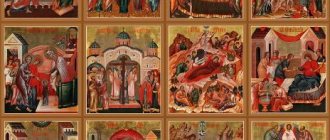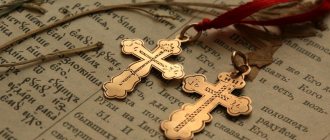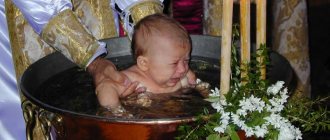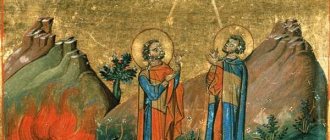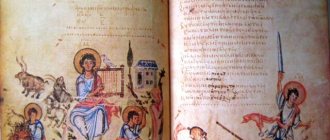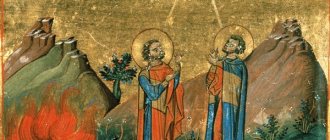Most Orthodox Christians have a special book in which they write down the names of people; it is called very simply - a memorial book. What is a memorial?
“Hello, Father Andrey... Father, please tell me, I can’t figure out the memorials. During our liturgy, many people stand with memorial books and read on their own, some put something in a basket. But I myself don’t understand how to do it right. As I understand it, we can write down everyone we pray for in the memorial and read it in the morning during home prayer. How to use it in the temple? I even saw that we have a small donation set for the commemoration - but who will read it then and when?”
— Elena (Question from the site hramnagorke.ru)
Most Orthodox Christians have this memorial. It can be very different in color
A memorial is a small book with the names of living and deceased people written in it.
Photo: ru.orthodoxlogos.com A memorial book is a small book or notebook with the names of living and deceased people written in it for commemoration. Such a book is also called a synodik.
Almost every person of the Orthodox faith has such a book. In it, he himself personally writes down the names of the living and the deceased.
The memorial is filled in according to seniority and in the genitive case. First, the names of patriarchs, priests, deacons, and then ordinary people are entered. The same goes for repose. An example can be seen below.
Page about health from the memorial. Names are written in the genitive case. Photo: georgios.info
The symbolic meaning of kutia
When burying the dead and remembering them, kolivo, or kutia, is brought to the temple - that is, boiled wheat seasoned with honey. Wheat means that the deceased will truly rise again from the grave: so wheat, thrown into the ground, first decays, and then grows and bears fruit. Therefore, the Lord Jesus Christ - our Resurrection - said: “Truly, truly, I say to you: unless a grain of wheat falls into the ground and dies, it remains alone; and if he dies, he will bear much fruit” (John 12:24). Honey consumed in kutia means that after the resurrection, the Orthodox and righteous will not have a bitter and regrettable life, but a sweet, favorable and blissful life in the Kingdom of Heaven.
The memorial must be brought to the temple and a service ordered for it.
How to use the memorial? A book with written names will need to be brought to the temple in order to order a proskomedia or litany from it. You can also order a prayer service and memorial service for it.
A prayer service is ordered for living people for whom you want to pray. Often ordered for sick people and for traveling people. The remembrance of deceased people is carried out at a memorial service.
In this photo, the priest reads the memorial service at the memorial service. At the funeral service, names only of the deceased are read. Photo: xn—-ctbbjdamkl8acedwy2ewfwc.xn--p1ai
A person can also read the memorial at home during prayer.
What can you bring to church in memory of the deceased?
Giving to the church is not just about money. Ancient Christians brought bread and wine to the graves of their dead. This was not done in order to appease God or satisfy the souls of the departed, as the pagans slandered - the bread and wine were intended for clergy and the poor, who were called upon to pray for the departed.
This pious custom has survived to our times. Kutia, bread, cereals, pancakes, fruits, candies, flour, and Cahors are brought to the memorial tables that stand near the eves. What was brought to the temple must be left on the table: while eating what was brought, the clergy commemorate those for whom the sacrifice was made (for this, a note with the name of the deceased can be placed in what was brought). During fasting, you should not bring meat. On the days of the meat-eater, you cannot bring meat food to the funeral table in the temple.
Each name on the list must be prayed for reverently
What is this list of names for? Each name in the list of the living means a human personality, in the list of the dead - a human soul that has gone to another world into an existence unknown to us. It is believed that the memorial is a spiritual field on which we can invisibly meet with all souls, both living and dead. They also say that you can meet not only the souls of people, but also their guardian angels.
But here it is important not just to read the memorial, re-reading the names of people, but to pray, beg God for the forgiveness of these people. To pray means to ask the Lord for mercy. That is why your prayer should be some kind of hope for the forgiveness of a person’s sins.
It is also worth paying attention to the color of the pages in the memorial on which the names of people are written. It is white, that is, the color of hope for the best. This can be compared to a mood. Morning mood is very important for a person, as it persists throughout the day. On this day you see everything in bright and joyful colors. If your mood is low in the morning, then the whole day will not go very well. We set the rhythm of life for ourselves. You can see what the memorial looks like in the photo below.
In this photo you can see the internal contents of the memorial. Please note that the color of the pages is white. Photo: sretenie.com
What you need to know about the memorial service
In addition to the daily commemoration of the deceased at daily circle services, the Church has established a number of funeral commemorations. Among them, the first place is occupied by the funeral service.
A memorial service is a funeral service, a service for the dead. The essence of the memorial service is the prayerful remembrance of our departed fathers and brothers, who, although they died faithful to Christ, did not completely renounce the weaknesses of fallen human nature and took their weaknesses and infirmities with them to the grave.
When performing a requiem mass, the Holy Church focuses our attention on how the souls of the departed ascend from the earth to the Judgment to the Face of God and how with fear and trembling they stand at this Judgment and confess their deeds before the Lord.
“Rest in peace” is sung during the funeral service. The physical death of a person does not mean complete peace for the deceased. His soul may suffer, not find peace, it may be tormented by unrepentant sins and remorse. Therefore, we, the living, pray for the departed, asking God to give them peace and relief. The Church does not anticipate with the Lord the all-justice of the mystery of His Judgment over the souls of our departed loved ones; it proclaims the fundamental law of this Judgment - Divine mercy - and encourages us to pray for the departed, giving complete freedom to our hearts to express themselves in prayerful sighs, to pour out in tears and petitions.
During the requiem and funeral service, all worshipers stand with lit candles, in commemoration of the fact that the soul of the deceased has passed from earth to the Kingdom of Heaven - into the Non-Evening Divine Light. According to established custom, candles are extinguished at the end of the canon, before singing “From the spirits of the righteous...”.
It is believed that the two parts of the memorial are similar to day and night
It is believed that the two parts of the memorial are similar to day and night. What does it mean? Those who are alive are as if in the light of day, we can see and hear them. But deceased people have gone to another world, which we cannot see, just as we cannot see at night.
Everyone on earth suffers, both sinful people and even the righteous. Everyone needs help anyway. Therefore, as carefully as we read the memorial, as deeply as the names of those people pass through us, we fulfill the Lord’s commandment about love, which, as we know, is above all laws.
Faith is a spiritual ascent. It is she who is born and strengthened in prayer. Hope drives out all doubt, and also brings down into our soul grace, which reveals itself as love. This is why many people pray for their enemies as if they were their best friends. He forgives them, even though they did not ask for forgiveness at all.
After praying for people, a person feels peace and tranquility.
The names of your enemies in the memorial are a kind of key to the spiritual treasury. This fire drives out anger and doubt, envy and vindictiveness. All this suggests that the commemoration is very important for an Orthodox Christian.
Notes of repose
Samples of notes on health and repose (Orthodox) are similar to each other, differing only in names. The repose note records the names of the deceased - all those who are dear to us, for whom we pray (relatives, loved ones, acquaintances, teachers, benefactors).
Just as we exalt prayers for the living, we also need to pray for the dead. Not only for our neighbors, but also for the entire family who did good to us in this life, helped and taught us.
Orthodox believe that deceased relatives, even those whom we do not know, pray for their descendants. Communication and unity with the dead is most acutely felt during fervent prayer for them. It has a strong impact on the soul of the person praying and produces a deep impression of close communication with those for whom the words of prayer are offered.
The following may be noted in the funeral note:
- “newly deceased” - if 40 days have not passed since death;
- “killed” - if a person became a victim.
After listing certain names, it is written: “with deceased relatives,” which means mention of all other deceased relatives.
A church note and a memorial are practically the same thing
Many often ask why a commemoration is needed if there is a church note? Essentially, the meaning is the same, but you need to fill out the church note every time you come to the temple. And the names are already written in the memorial, you just need to submit it to the temple and pay an affordable donation.
After this, the memorial is transferred to the altar, where the clergy read the names, remembering them. Then they remove the particles from the prosphora. At the end of the Divine Liturgy, these particles are immersed in the chalice where the Body and Blood of Christ is located. At the same time, the priest says the following words: “Wash away (wash away), Lord, the sins here (here) of those remembered by Your Honest Blood, by the prayers of Your saints.”
Many also believe that a memorial is needed in order to pay off debts to deceased people. And also this is a kind of preparation for its own death, when the soul meets those whom it loved, for whom it prayed for so long.
Notes in the church
Everyone knows and understands that believers pray in church. By submitting a note, you will be sure that the priest will pray for those listed in it. Of course, prayer in the temple - the house of God - from the lips of a clergyman will be much stronger than your home appeal to the Lord. Moreover, prayer will be offered during the service, and this will give it even greater power.
Believers give notes (remembrances, in church style) where they sell candles in a candle box. You can ask the ministers there for a sample of notes on health and repose. It must have a holy cross depicted on it, and it can contain no more than a dozen names. If you need to mention more, write several sheets.
Now let’s find out when memorial notes are submitted:
- It is better to do this every time you visit the temple. You can do this specially, for certain occasions.
- On your child’s birthdays and baptisms, be sure to submit wellness notes.
- In case of illness of loved ones, during hospitalization or preparation for surgery.
- If a loved one has fallen into sin: theft, drunkenness, fornication, etc.
Negligent prayer for the living and the dead brings harm to a person
It also becomes clear that inattentive prayer brings harm to a person. Negligent prayer as a mirror of hypocrisy. A memorial is also a cloth that can be used to wipe away the tears of mourning people.
It is believed that the memorial, which is given to the altar, becomes similar to the tabernacle of Abraham, where all people in need, who need peace, find it. When you read the memorial, it becomes like the sky or sparkling stars. And when careless prayer happens, it’s to the sky, which is completely covered with clouds. This is the difference between good prayer and absent-minded prayer.
A sinful person is an enemy to his own soul, which suffers not only there, but in this life on earth. At first the person is not aware of this. But in the soul of a sinner there is a memory of heaven, so the names of people who have lost God are filled with tears.
When a person prays for other people, even guardian angels pray for him.
Also, a memorial is a record as a keepsake for your descendants, about your ancestors who lived on earth. That is why this little book is very important.
Private requirements
In addition to the Liturgy, Vespers, and Matins, in the Orthodox Church there are private services called services (since they are performed upon request, by order of parishioners), including a prayer service (for the living) and a memorial service (for the deceased). They are usually performed at the end of the Liturgy.
Notes for a prayer service or memorial service are formatted as follows: the type of note is indicated at the top (for example, “Prayer of thanksgiving to the Savior,” “Requiem service”), and then the names are written in the usual order. In many monasteries there is a special requirement: the commemoration of the living and the dead during the reading of the Psalter (read by the inhabitants of the monastery every day, often in turn throughout the day - the so-called indestructible Psalter).
In churches or monasteries where there are revered shrines (icons, relics of saints), there is a tradition of reading an akathist before them. Notes are also accepted for commemoration during this reading.
The common prayer of believers has a special power of grace. The Lord said about church prayer: for where two or three are gathered in My name, there I am in the midst of them (Matthew 18:20). Church prayer has special power also because it is offered by a priest specially appointed to perform sacred rites and pray for people.
Realizing that the most we can do for our loved ones (especially the deceased) is to submit a note of remembrance at the Liturgy, we should not forget to pray for them at home and perform acts of mercy.
At home, praying for your family and friends, you need to read special prayers
At home, when praying for your family and friends, you need to read special prayers.
The following prayers are read for living people:
Save, Lord, and have mercy on our God-protected country, its authorities and army, so that we may lead a quiet and serene life in all piety and purity. (Bow).
Save, Lord, and have mercy on the Great Master and Father of our Most Holy Patriarch (name), the Right Reverend metropolitans, archbishops and Orthodox bishops, also priests and deacons, and all the church servants whom You have appointed to shepherd Your spiritual flock, and through their prayers, have mercy and save me, a sinner. (Bow).
Save, Lord, and have mercy on my spiritual father (his name), and through his holy prayers, forgive my sins. (Bow).
Save, Lord, and have mercy on my parents (their names), brothers and sisters, and my relatives according to the flesh, and all those close to my family, and friends, and grant them Your earthly and heavenly blessings. (Bow).
Save, Lord, and have mercy, according to the multitude of Your bounty, on the holy monks, monks and nuns, and on all those living in reverence and fasting in monasteries, in deserts, in caves, mountains, gates, stone clefts, on pillars, islands of the sea, and in every place of dominion Your faithfully living and piously serving You, and praying to You. Ease their burden, and comfort their sorrow, and give them strength and strength from You for achievement, and through their prayers grant me remission of sins. (Bow).
Save, Lord, and have mercy on the old and the young, the poor and orphans, and widows, and those who are in sickness and sorrow, in troubles and sorrows, difficult circumstances and captivity, in prisons and imprisonment, especially Your servants, for Your sake and the Orthodox faith persecuted by pagans, atheists, apostates and heretics, and remember them, visit, strengthen, comfort, and soon by Your power give them relief, freedom and deliverance. (Bow).
Save, Lord, and have mercy on those sent to serve, our traveling fathers and brothers, and all Orthodox Christians. (Bow).
Save, Lord, and have mercy on those sent to serve, our traveling fathers and brothers, and all Orthodox Christians. (Bow).
Save, Lord, and have mercy on those whom I, through my foolishness, have seduced, and turned away from the path of salvation, and drawn to evil and inappropriate deeds; By Your Divine Providence, turn them back to the path of salvation. (Bow).
Save, Lord, and have mercy on those who hate and offend me and cause me trouble, and do not allow them to perish because of me, a sinner. (Bow).
Enlighten those who have departed from the Orthodox faith and are blinded by destructive heresies with the light of Your knowledge and come to Your Holy Apostolic Catholic Church. (Bow).
The following prayers are read for the departed:
Remember, Lord, the most holy patriarchs, most reverend metropolitans, archbishops and Orthodox bishops who have departed from this life, all who served You in the rank of priest, and in the clergy, and in the monastic rank, and rest in Your eternal abodes with the saints. (Bow).
Remember, Lord, the souls of Your departed servants, my parents (their names), and all relatives according to the flesh; and forgive all their sins, voluntary and involuntary, giving them the Kingdom of Heaven, and the participation of Your eternal blessings, and the pleasure of Your endless and blissful life. (Bow).
Remember, Lord, all those who have fallen asleep with the hope of resurrection and eternal life: our fathers and brothers and sisters, both the Orthodox Christians who lie here and everywhere, and with Your saints, where the light of Your face shines, settle them, and have mercy on us, as Good and Lover of Humanity. Amen. (Bow).
Lord, grant forgiveness of sins to all our fathers, brothers and sisters who have previously departed in faith and hope of resurrection, and create for them eternal memory (three times).
Symbol of faith
Already in the ancient Church, commemoration was carried out according to the so-called diptychs, which were two connected tablets (at first they were covered on the inside with wax, the inscriptions were made with a special twig-style, and then they began to make them from parchment or paper). The names of the living were written on one side of the table, and the names of the deceased on the other. Commemoration by diptychs (memorials) was considered a great honor. Only Christians of an impeccable lifestyle were included in these church memorials - first bishops, then priests, and then laity. Every Christian family had its own home memorial.
This division into two types of diptychs has survived to this day - and now in the church there are general, or church, diptychs (the so-called synodics), and private, home memorials. Synodics are held in monasteries and churches, the names of people for whom eternal commemoration is performed or ordered for a certain time are entered in them; Parishioners present their commemorations for commemoration. The simplest memorial is a note that is written before each service.
Since apostolic times, the reading of memorials has been an indispensable part of the most important of the daily services - the Liturgy. The reading of memorials is combined with the offering of the Most Holy Sacrifice of the Body and Blood of Christ, by the power of which a petition is raised to the Lord to wash away the sins of those commemorated.
You can buy a memorial in the temple. Like the ancient diptych, it consists of two parts - a list of names of the living and a list of names of the deceased. The memorial is convenient not only for church prayer (it is given instead of a note), but also at home - here you can indicate the days of the angels of those for whom you are praying, and other memorable dates. The names of all the living and deceased are written down in the memorial - and thus the memorial becomes a kind of family book.
Memorial of the Nyametsky Monastery: the handwriting of Elder Paisius
A memorial is a small book or notebook with the names of the living and the dead written in it for prayerful remembrance. Also called a synodik.
Almost every Christian has a small book called a memorial - an image of an ancient diptych, where the names of the living and the dead are written. He gives this book in the church for proskomedia and litanies, for prayer services and memorial services; he must read it daily in his home prayers.
What does the list of names mean? Each name represents a person: in the list of the living - a human personality, in the list of the dead - a soul that has gone to another world - into an existence unknown to us. A memorial is the spiritual field on which we invisibly meet the souls of the living and the dead, not only with them, but also with their guardian angels. A memorial service is a connection between the living and the dead, between everyone who bears the name of Christian, a connection through grace, where there are no obstacles and distances, no distant and close ones, no separation and distinction between those living on earth and those who are underground, whose bodies remain in their graves as if they were on their beds until the resurrection from the dead. We are all in a spiritual city, whose name is the Church.
Sorokoust about repose
This type of commemoration of the dead can be ordered at any hour - there are no restrictions on this either. During Great Lent, when the full liturgy is celebrated much less frequently, a number of churches practice commemoration in this way - in the altar, during the entire fast, all the names in the notes are read and, if the liturgy is served, then parts are taken out. You just need to remember that people baptized in the Orthodox faith can participate in these commemorations, just as in the notes submitted to the proskomedia, it is allowed to include the names of only baptized deceased.
Order from the monastery in Jerusalem
The memorial is a meeting place; the way there lies through the human heart. Only the voice of the heart is heard in the sky, and the words of the lips alone spread through the air without a trace and disappear like ripples on the surface of water. Careless prayer does not unite human souls; it looks like a chain with broken links. Under every name there is a person hidden, with his needs, suffering and pain. Every name is a mouth that asks us for help, especially the names of the dead are silent screams from the graves. We must treat names as if they were the people behind them, as if they were under a veil.
There is an ordinary expression “read the memorial”. How often do we do this literally - we read, rather than pray, we list names as if we were counting pebbles, and often we read with a sleepy consciousness turned off, a relaxed will, scattered thoughts, as if with blind eyes. Prayer has the same root with the words “to pray, entreat, have mercy, mercy, tenderness.” To pray is to ask God for mercy, just as a convicted person asks a judge for mercy. To beg means to feel someone else's pain as if it were your own; it is to extend a hand to the fallen; it is as if to take upon oneself the weight of one who is exhausted under a burden. To pray is to turn to the sea of divine mercy, so prayer must be animated by hope; even the white color of the memorial pages on which the names are written serves as a background to the prayer, or rather a sign of the hope with which we should say them.
The two parts of the memorial are like day and night. The living are on earth, as if in the light of day; we can see, hear and touch them. The deceased have gone into a world that remains a mystery to us: they are alive, but we do not see them, as in the darkness of the night.
A memorial is a symbol of the fact that our loved ones are always with us. A memorial is a memory of death, with which each of us signed an agreement on our birthday: those who are on the list of the living will in due time move to the list of the dead, but there is not a single name that would be transferred back. Not a single person in the world has ever turned back on this path, just as a river wave cannot go against the flow. At the same time, the memorial is evidence that there is no death, that death is only separation, but prayer overcomes it too.
Everyone on earth suffers - both the righteous and the sinful; everyone needs help and compassion, so names written in ink are spiritually written with tears and blood. The memorial is a barometer of our love: how carefully we read it, how deeply the names pass through our hearts and are warmed with warmth - to the extent we fulfill God’s commandment about love, which is above the law. Faith, hope and love are triune. But faith is the first stage of spiritual ascent; it generates attention and strengthens patience in prayer. Attentive prayer gives a person some kind of mysterious notification that he has been heard by God. Hope drives out doubt and brings grace into the soul, which reveals itself as love; then a person prays for his enemies as for friends, and does not want anyone to be punished for him. He prays for the well-being of his offenders and forgives them, even if they did not ask for forgiveness. The names of enemies in the memorial are the key to the spiritual treasury, this is the fire that burns envy like straw, drives out anger and vindictiveness like a snake from the heart, and makes enemies friends. Praying with concentration and attention is difficult, like shedding blood; therefore, the memorial is like an invisible battlefield; but after fervent prayer for people, a person feels peace of conscience and joy like the triumph of victory. A memorial service is an opportunity to pay off the debt to the deceased that remains behind us. A memorial is a sealed letter sent to God. A memorial service is a test of faith, a revelation of hope, a test of love, it is a revelation of what is hidden in our heart: compassion or indifference, the warmth of spring or the cold of winter. A memorial service is a preparation for one’s own death, when the soul will be met by those whom it loved, for whom it prayed, who preceded it on the path to eternity. A memorial service is a meal in your home for the poor and wanderers, and a feast of love for friends. Inattentive prayer is like spreading a tablecloth without food: you invited guests and sent them away hungry. Careless prayer is a mirror of your hypocrisy. A memorial is a cloth with which you can wipe away the tears of those who mourn or those who are offended by you. A memorial is a rope thrown to someone who is in hell, just as a rope is thrown to someone drowning in a pool. The memorial, given to the altar for the liturgy, becomes similar to the tabernacle of Abraham, where all those in need find peace. When you carefully read the memorial, it becomes like a sky sparkling with stars, and when you are careless, it becomes like a sky covered with clouds.
A sinner is the enemy of his own soul, which suffers not only in the next century, but also here on earth, even if he himself does not realize this, just as someone born in prison does not understand that he is deprived of sunlight. But in the soul of even a sinner there is a certain memory of heaven and, therefore, the names of people who have lost God are the eyes of their spirit, filled with tears, which are addressed to you with prayer.
A memorial is an opportunity to do good to people always and everywhere. When a person prays from the heart for others, then their guardian angels pray for him; therefore, the memorial is one of the sources of spiritual light for yourself, and your prayer, like reflected light, strengthened by the prayers of angels, returns to you. The memorial is a piggy bank of spiritual alms, and your guardian angel will put it on the scales of God’s justice on the day of Judgment; and then you will see that each of your prayers, like a widow’s mite, has turned into bars of gold. A memorial is a harbinger of your future meeting with those for whom you prayed; they will be more grateful to you than the hungry ones to the one who fed them. The highest happiness of a person is the ability to love. Love is life itself, and a memorial is an opportunity to learn every day the science of loving people.
In the memorial, paths cross: from heart to heart - those on earth; prayer for those who are saved is a path that goes to heaven; prayer for those who are condemned is a ray descending into the abyss of hell. These three paths, intersecting with each other, form a cross.
The Lord said: “With the measure you use, the merciful will be blessed, for they will receive mercy.” Your memorial, if you often open it like a bird’s wings, this is the hope that your name will be written in the eternal Memorial in heaven in the memory of God.
Archimandrite Raphael (Karelin)
Why do churches give notes about health and repose? How to write them correctly?
Notes, or, speaking in church terms, commemorations, are given by believers at the candle box (the place at the entrance to the church where candles are sold and requirements are filled out) before the start of the Divine Liturgy - the main service of the Orthodox Church, performed in the morning. The notes are passed to the altar, where the clergy, reading - remembering - them, take out particles from the prosphoras (small two-part bread with the image of a cross).
At the end of the Liturgy, these particles are immersed in a chalice with the Body and Blood of Christ; at the same time, the priest pronounces the following words: “Wash away (wash away), Lord, the sins here (here) of those remembered by Your Honest Blood, by the prayers of Your saints.” Thus, the souls of those remembered for health and repose are given special grace from God.
Commemoration during the Divine Liturgy is a special type of church-wide prayer; By ordering it, we take the best care of the health and spiritual salvation of our loved ones and the blissful repose of the deceased. In addition to ordinary notes, you can submit custom notes (with a special commemoration) during the service, order magpies, semi-annual, annual and eternal commemorations.
When writing notes or filling out memorial books - small books about health and repose, sold in every church - certain rules must be followed.
In the notes only the names of those remembered are written and only in the genitive case (answering the question of whom? - for example, Andrey, Maria). At the beginning of the note you should draw a cross and write “On health” or “On repose.”
Commemoration at the Divine Liturgy (Church note)
Health is commemorated for those who have Christian names, and repose is remembered only for those baptized in the Orthodox Church.
Notes can be submitted at the liturgy:
For proskomedia - the first part of the liturgy, when for each name indicated in the note, particles are taken out of special prosphoras, which are subsequently dipped into the Blood of Christ with a prayer for the forgiveness of sins
Order from the monastery in Jerusalem
ABOUT THE LIVING
Remember, Lord Jesus Christ, our God, Thy mercy and generosity from all eternity, for whose sake Thou didst become man, and Thou didst deign to endure crucifixion and death, for the sake of the salvation of those who believe in Thee; and rose from the dead, ascended into heaven and sits at the right hand of God the Father, and listens to the humble prayers of those who call upon You with all their hearts; incline Your ear and hear the humble prayer of me, Your indecent servant, into the stench of the spiritual fragrance that is brought to You for all Your people.
And in the first place, remember Thy Holy, Catholic and Apostolic Church, which Thou hast provided with Thy venerable Blood, and established, and strengthened, and expanded, multiplied, pacified, and preserved the insurmountable gates of hell forever; Calm the tearing of the Churches, quench the pagan vacillations, and quickly destroy and eradicate the heresies of rebellion, and convert them into nothingness by the power of Your Holy Spirit. (Bow)
Save, Lord, and have mercy on our God-protected country, its authorities and army, so that we may live a quiet and silent life in all piety and purity. (Bow)
Save, Lord, and have mercy on the Great Lord and Father of our Holiness the Patriarch, Your Eminence metropolitans, archbishops and Orthodox bishops, priests and deacons, and the entire church clergy, who You have appointed to shepherd Your verbal flock, and through their prayers have mercy and save me, a sinner. (Bow)
Save, Lord, and have mercy on my spiritual father (name), and with his holy prayers forgive my sins. (Bow)
Save, Lord, and have mercy on my parents (names), brothers and sisters, and my relatives according to the flesh, and all the neighbors of my family, and friends, and grant them Your peaceful and most peaceful goodness. (Bow)
Save, O Lord, and have mercy on the old and the young, the poor and the orphans and the widows, and those who are in sickness and sorrow, troubles and sorrows, conditions and captivity, prisons and imprisonments, and even more so in persecution, for You for the sake of the Orthodox faith, from the tongue of the godless, from the apostate and from the heretics, Thy present servants, and remember, visit, strengthen, comfort, and soon by Thy power I will weaken, grant them freedom and deliver. (Bow)
Save, Lord, and have mercy on those sent into service, those traveling, our fathers and brethren, and all Orthodox Christians. (Bow)
Save, Lord, and have mercy on them who I tempted with my madness, and turned away from the path of salvation, and led me to evil and inappropriate deeds; By Your Divine Providence, return again to the path of salvation. (Bow)
Save, Lord, and have mercy on those who hate and offend me, and those who create misfortunes against me, and do not leave them to perish for me, a sinner. (Bow)
Those who have departed from the Orthodox faith and are blinded by destructive heresies, enlighten with the light of Your knowledge and honor the Catholic Church with Your Holy Apostles. (Bow)
ABOUT THE DECEASED
Remember, Lord, the most holy patriarchs, eminence metropolitans, archbishops and Orthodox bishops who departed from this life, who served You in the priesthood and clergy, and in the monastic rank, and rest in Your eternal settlements with the saints. (Bow)
Remember, Lord, the souls of Your departed servants, my parents (names), and all relatives according to the flesh: and forgive them all sins, voluntary and involuntary, granting them the Kingdom and the communion of Your eternal good things and Your endless and blissful life of pleasure. (Bow)
Remember, O Lord, and all in the hope of resurrection and eternal life, those who have fallen asleep, our fathers and brothers and sisters, and the Orthodox Christians who lie here and everywhere, and with Your saints, where the light of Your face is present, have mercy on us, for He is Good and Lover of humanity. Amen. (Bow)
Grant, Lord, remission of sins to all who have previously departed in the faith and hope of resurrection, our fathers, brothers and sisters, and create for them eternal memory. (Bow)(Repeated three times)
READING OF MEMORIALS AT THE LITURGICAL FUNERAL LICTENY
The missal in the rite of the Liturgy of St. John Chrysostom contains a funeral litany, after which the deceased are remembered twice by exclamation and once secretly by name. There are no deliberate, precisely defined instructions in the Charter about when this litany can be proclaimed at the liturgy. The Charter assumes that after it has outlined a harmonious, consistent system of remembrance in the instructions for various other cases, strictly adhered to down to the smallest detail, it is self-evident that the funeral litany at the liturgy is possible only in full accordance with this entire system. The clause preceding the text of the funeral liturgy in the rite of Chrysostom’s liturgy: “if there is an offering for the departed, say litany,” already suggests that not every liturgy can have this litany, although the offering of the 5th prosphora and the commemoration of the departed connected with it must necessarily be at every liturgy. Obviously, the expression: if there is an offering for the deceased cannot be understood in the sense that if a prosphora is given with a commemoration and a request to be remembered at the liturgical litany. The remark of the Missal should be understood only in the sense that on a given day the Church Charter generally allows public commemoration of the dead. In the rite of the Liturgy of Basil the Great, in which the offering of the fifth prosphora is as obligatory as in the Liturgy of Chrysostom, there is no mention at all of the funeral litany. This is because the Liturgy of Basil the Great is celebrated only on Sundays and great holidays, when everything for the dead is removed from all services, even from the Midnight Office.
At Matins, the recitation of the funeral litany is permitted only when the funeral kontakion with the saints of repose is also due at the same Matins. In other cases, even at everyday Saturday matins, where there is a funeral sedalen according to the second kathisma, one funeral troparion for each song of the canon and there may be a funeral luminary, but where there is no funeral kontakion, there cannot be a funeral litany. Accordingly, we should talk about liturgy. When the Charter allows the singing of the funeral kontakion at the liturgy, then the funeral litany can also be said without prohibition. When the singing at the liturgy “Rest with the saints” is forbidden, and this prohibition, in addition to the corresponding reservations when presenting individual cases, is deliberately emphasized in the 52nd chapter of the Typikon: In these days..., the kontakion “Rest with the saints” is not the verb, then it cannot be at the liturgy and funeral litany. This is what they do in statutory, strict monasteries. Charter, e.g. The Sarov Hermitage definitely cancels the funeral liturgy for the liturgy on Sundays, the feasts of the Lord, the Mother of God and saints with vigil and polyeleos, or when there is a Great Doxology, on pre- and post-feast days, as well as from the Wednesday of Holy Week to the Sunday of All Saints, and from Christmas Christ before the Epiphany.
The custom of reciting the funeral litany at the liturgy on Sundays and holidays spread to Rus' not long ago. During the time of Metropolitan Philaret of Moscow († November 29, 1877), it apparently was not yet widespread. Saint Philaret himself, having received the news of the death of his sister on Saturday, writes to his relatives on Tuesday: “Having received your news on Saturday, on Sunday I celebrated the liturgy, praying for her secretly. The memorial service was after Vespers, open commemoration at the liturgy yesterday.” Metropolitan Sergius (Lyapidevsky - † February 17, 1898), a student and admirer of Metropolitan Philaret, who was jealous of the preservation and restoration of Philaret’s traditions, issued an order for the Moscow diocese to stop the festive commemoration of the departed, which had spread after Metropolitan Philaret.
They say that there is an exceptional case when, even on holidays, the recitation of the funeral litany at the liturgy should be allowed - this is when in the church there is a coffin with the body of the deceased, whose funeral service will be held at the end of the liturgy.
The everlasting psalter
The indefatigable Psalter is read not only about health, but also about peace. Since ancient times, ordering a commemoration on the Everlasting Psalter has been considered a great alms for a departed soul.
It is also good to order the Indestructible Psalter for yourself; you will feel the support. And one more important point, but far from the least important, there is eternal remembrance on the Undying Psalter. It seems expensive, but the result is more than millions of times more than the money spent. If this is still not possible, then you can order for a shorter period. It's also good to read for yourself.
Order from the monastery in Jerusalem
THE CHARTER LIMITS THE READING OF MEMORIALS AT THE LITURGY
If, when performing memorial services and other memorial services, it would be more appropriate and edifying to shorten the public reading of memorials by the clergy, replacing it with the aloud commemoration of only a few names and general formulas, with the simultaneous secret reading of their memorials by the pilgrims themselves, then this should be especially considered desirable for the liturgy. Sometimes the reading of memorials at the liturgy takes almost more time than the rest of the liturgy. One gets the impression that the most important thing is the re-reading of the names, and everything else following the liturgy is only incidental, as some kind of addition, as something completely secondary. What a misunderstanding of the meaning of the Holy Eucharist!…
Church services in Orthodox churches in Jerusalem
Sorokoust about repose
The everlasting psalter
Church note
Prayer for health
Sorokoust about health
Temples and monasteries where services are held
Like
SocButtons v1.5
How to Pray for Suicides
The venerable Optina elders allowed even suicides to be remembered at cell prayer, for whom, according to the 14th rule of Timothy of Alexandria, there could be no offering in the Church. Thus, the Monk Leonid, in the Leo schema, consoled and instructed one of his students (Pavel Tambovtsev), whose father committed suicide: “Commit both yourself and the fate of your parent to the will of the Lord, the all-wise, all-powerful. Do not test the Most High's fate. Striving with humility to strengthen yourself within the limits of moderate sadness. Pray to the all-good Creator, thereby fulfilling the duty of love and filial duties. - according to the spirit of the virtuous and wise: “Seek, O Lord, the lost soul of my father: if it is possible, have mercy. Your destinies are unsearchable. Do not make this my prayer a sin, but Thy holy will be done.” Pray simply, without testing, committing your heart to the right hand of the Most High. Of course, it was not the will of God for such a sad death of your parent: but now it is completely in the will of the Mighty One to cast both soul and body into the fiery furnace, Who both humbles and exalts, dies and gives life, brings down to hell and exalts. Moreover, He is so merciful, omnipotent and loving that the good qualities of all earthly beings are nothing before His highest goodness. For this reason, you should not be overly sad. You will say: “I love my parent, which is why I grieve inconsolably.” Fair. But God is beyond comparison greater than you. loved and loves him. This means that you can only leave the eternal fate of your parent to the goodness and mercy of God, who, if He deigns to have mercy, then who can resist Him?
Another Optina elder, the Monk Ambrose, wrote to one nun: “According to church rules, a suicide should not be commemorated in church, but his sister and relatives can pray for him privately, as Elder Leonid allowed Pavel Tambovtsev to pray for his parent. Write out this prayer... and give it to the family of the unfortunate person. We know many examples that the prayer conveyed by Elder Leonid calmed and consoled many and turned out to be valid before the Lord.”
It is said about the ascetic schema-nun Afanasia that she, on the advice of Blessed Pelageya Ivanovna of Diveyevo, fasted and prayed three times for 40 days, reading the prayer “Virgin Mother of God, rejoice” 150 times daily for her brother, who hanged himself while drunk, and received a revelation that Through her prayer, her brother was freed from torment.
When is it necessary to commemorate the deceased?
The newly deceased is commemorated on the third, ninth and fortieth day after death, and the deceased - every year on the day of death (these days are called memorial days). Saint Simeon of Thessaloniki explains this custom this way: “Trinities (that is, commemoration on the third day after the death of the deceased) are performed because the Holy Trinity bestowed the remembered existence of the deceased, which even after repose will appear in its best form, having changed into a state better than what it was in beginning. Devyatiny (commemoration on the ninth day) are performed so that the spirit of the deceased... unites with the holy spirits of angels, so that through the intercession of these spirits, united in three faces, the Trinitarian God is propitiated and begged for the union of the human soul with the spirits of all saints. The Sorokousts are performed in remembrance of the Ascension of the Lord, which happened on the fortieth day after the Resurrection - and for this purpose, so that he (the deceased), rising from the grave, ascended to meet the Judge, being caught up in the clouds, and so would always be with the Lord.
Then the relatives commemorate the deceased every year, showing by this that he lives with them in soul, that he is immortal, that he will be renewed when the Creator desires and erects his body... Therefore, on all these days, it is necessary to commemorate everyone and with all possible care, especially it is necessary to combine these commemorations with the offering of the Most Terrible and Life-Giving Sacrifice, which was given for this purpose: because through petitions, prayers, consecrated sacrifices and charity to the poor, not only those who have sinned, but those who have departed in repentance, remission of sins, weakness and change of torment are granted , but also those who lived righteously and achieved a good and God-loving death, as Chrysostom thinks in his interpretation of the Acts, are given greater purification, higher degrees of approach to God, special boldness at the Judgment of Christ and predominantly the bright areas of the saints of God.”
The anniversary of the deceased, the day of his memory, is for those who remember it a kind of holiday, albeit of a sad nature. According to pious custom, along with those performing the commemoration, their living relatives and friends will take part in it and then they will remember the deceased with a kutia, and perhaps even a fuller meal.
Of course, commemoration can be performed in memory of the deceased at any other time, at the request of the person praying.
In addition to private commemoration, there is also a general church commemoration, at which all the fathers and brethren who have passed away from time immemorial are remembered. These Ecumenical memorial services (parental Saturdays) are celebrated on Meat Saturdays, Trinity Saturday, Demetrius Saturday, the 3rd and 4th weeks of Great Lent, as well as on Radonitsa and August 29 and are dedicated to the remembrance of all brothers in faith and those who were caught sudden death and were not guided into the afterlife by the prayers of the Church. On April 26/May 9, a commemoration is held for the deceased soldiers who laid down their lives on the battlefield for the Faith and Fatherland.
